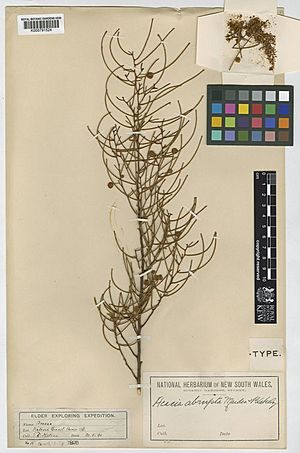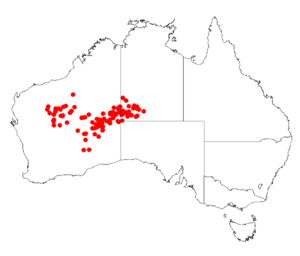Acacia abrupta facts for kids
Quick facts for kids Acacia abrupta |
|
|---|---|
 |
|
| K000791524 | |
| Scientific classification | |
| Genus: |
Acacia
|
| Species: |
abrupta
|
 |
|
| Occurrence data from Australasian Virtual Herbarium | |
Acacia abrupta is a type of shrub, a bit like a bush, that belongs to the Acacia family. It's special because it only grows in dry, desert-like areas in central and western Australia.
What Does Acacia Abrupta Look Like?
This spreading shrub usually grows to be about 0.6 to 3 meters (2 to 10 feet) tall. It has a smooth, hairless surface, which botanists call glabrous. Its bark is a light grey color.
The leaves of Acacia abrupta are quite interesting. They are actually not true leaves but flattened leaf stalks called phyllodes. These phyllodes are dark green and stand upright or curve slightly inwards. They are usually 3 to 5 centimeters (1.2 to 2 inches) long, but some can reach up to 9 centimeters (3.5 inches). They are very thin, only about 0.5 to 1 millimeter wide.
This plant blooms from July to September, showing off its pretty yellow flowers. The flowers grow in simple, round clusters, called inflorescences. Each cluster has 25 to 35 golden-colored flowers and grows by itself where a leaf meets the stem (this spot is called the axil).
After the flowers, the plant produces long, brown seed pods. These pods are slightly squeezed between each seed and have a flattened, oval shape. They can be up to 5 centimeters (2 inches) long and about 2.5 to 3 millimeters wide.
How Was Acacia Abrupta Discovered?
This plant was first officially described by two botanists, Joseph Maiden and William Blakely. They wrote about it in 1927 in a scientific paper. The paper was called Descriptions of fifty new species and six varieties of western and northern Australian Acacias, and notes on four other species. It was published in a journal called Journal and Proceedings of the Royal Society of Western Australia.
Sometimes, plants can have more than one scientific name. For Acacia abrupta, there is one other name it was known by for a while: Racosperma abruptum. This name was given by another botanist named Pedley in 2003, but now Acacia abrupta is the accepted name.
A. abrupta is part of a group of acacias called the Acacia wilhelmiana group. It's also closely related to another plant called Acacia ascendens. It can sometimes be confused with Acacia helmsiana because they grow in the same places.
Where Does Acacia Abrupta Grow?
Acacia abrupta is found in specific parts of Western Australia, mainly in the Pilbara and Goldfields regions. It likes to grow on and around sand dunes, flat sandy areas called sandplains, and on gravelly hillsides. It prefers red, sandy soils that are rich in iron, known as lateritic soils.
This plant is spread out across a wide area. You can find it from around Newman in the west. From there, it stretches east through the Pilbara, the Great Sandy Desert, and the Gibson Desert. It even crosses the border into the Northern Territory, reaching as far as Lake Amadeus in the east. It often grows alongside a type of spiky grass called spinifex.

